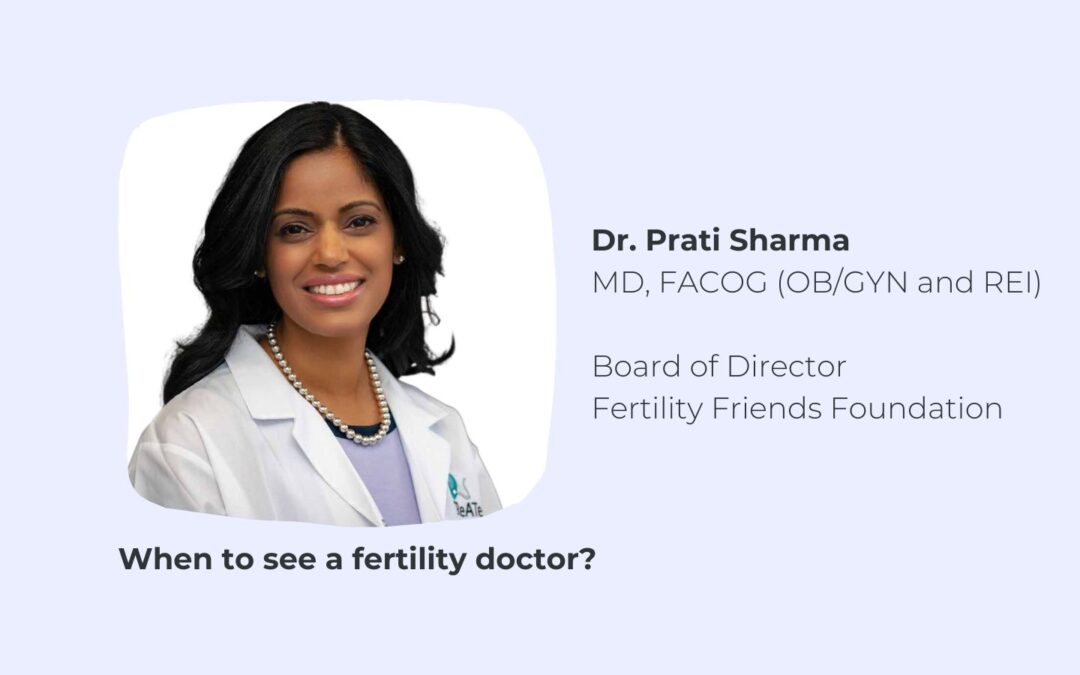Dr. Prati Sharma is a Board of Director at Fertility Friends Foundation, a Reproductive Endocrinologist and Infertility Specialist at Create Fertility Centre in Toronto with over 15 years of experience in treating infertility. She is passionate about patient-centered, individualized care and loves the close bond she develops with her fertility patients throughout their journey.
When to see a fertility doctor?
As we start 2024, many people are considering their options for exploring their fertility and building a family. But many ask the question, when is the right time to see a fertility doctor?
Here are some tips from Dr. Prati Sharma:
Primary infertility: If you have never been pregnant before and have been trying to conceive for 12 months or more if you are under 35 (female). If you are over 35, we recommend seeing a fertility doctor after 6 months of trying to conceive. This is due to the fact that we know that as a woman gets older, her egg number and quality (ovarian reserve) declines so we want to see women over 35 sooner to get them into treatment sooner if needed.
Secondary infertility: If you have had a baby before or have been pregnant before whether that ended in a live birth, miscarriage, loss, stillbirth, or ectopic pregnancy. The same rules apply. See a fertility doctor for a workup after a year for females aged under 35 and women over 35, after 6 months of trying.
Gynecological conditions: Conditions such as Polycystic Ovary Syndrome (characterized by irregular cycles, signs of high male hormones and characteristic “polycystic” appearing ovaries on ultrasound), endometriosis (associated with painful periods, cysts, painful intercourse), fibroids (benign growths in the uterus), uterine polyps, pelvic adhesions/scar tissue/Asherman’s syndrome can be associated with infertility. See a fertility doctor sooner if you think you may have any of these conditions or have been diagnosed with any of them. There is no need in these situations to wait 6 months to 1 year.
Recurrent Miscarriages: If you have experienced two or more miscarriages, you may warrant a specialized workup to determine the causes of miscarriage that can be treated. These include genetic conditions such as translocations, abnormalities in the uterine and tubal architecture/pelvic anatomy, blood clotting or immune factors, or other issues which can be evaluated and treated by a fertility doctor.
Family or personal history of premature ovarian failure or premature menopause: If you or anyone in your family has had premature menopause or ovarian insufficiency or failure, your egg reserve may be lower than expected and you could need treatment to conceive sooner. In these scenarios, seeing a fertility doctor early on can be integral to conceiving and exploring family-building options.
LGBTQ+ community: If you are a member of the LGBTQ+ community, you may need a sperm donor, egg donor or gestational surrogate to conceive. In the case of same-sex females, there is an option of reciprocal IVF where one partner donates eggs and one carries is a potential treatment. For same-sex male couples, egg donation and surrogacy are offered by many fertility clinics. For single women, donor sperm insemination is a good starting point and for single men, also using an egg donor and surrogate. The transgender population also often requires fertility assistance to conceive or if they are interested in egg or sperm freezing before gender-affirming treatment.
Fertility preservation (medical and social): You may not be ready to conceive NOW, but know you may want to conceive later. Through a fertility evaluation, you can understand your reproductive potential and consider egg or embryo or sperm freezing which is a reliable way to “freeze” your fertility in time until you are ready to build a family. Also, for those undergoing medical therapy that can affect fertility i.e. chemotherapy or certain medications, egg or sperm freezing before treatment can protect your fertility before undergoing medical treatment.
Just because! We are lucky to be in a time when having a fertility assessment to get a “snapshot” of your reproductive health is very possible and easy! For women, this involves a pelvic ultrasound, and bloodwork which usually can be done in one visit and for men this includes a semen analysis and bloodwork, also one visit.
If you are interested in learning and taking charge of your reproductive health and may not know when you want to build a family, see a fertility doctor to feel empowered and get information!
Fertility Friends Foundation is here to make a difference!
